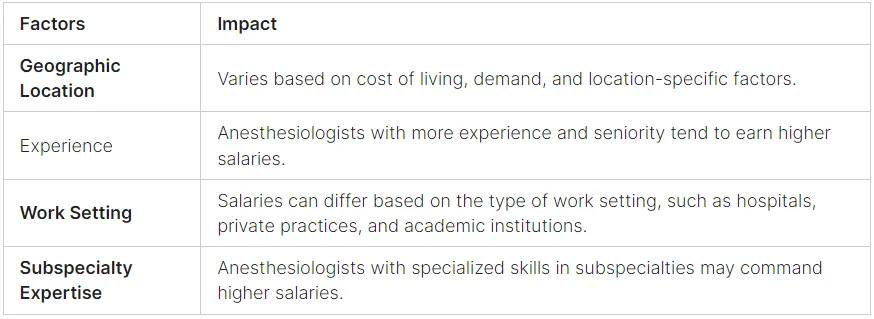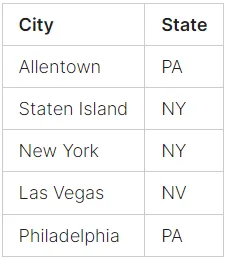Average Annual Growth Rate of Anesthesiologist Salary: Understanding Compensation Trends

As an anesthesiologist, it's essential to stay informed about the trends and factors that affect your salary. Understanding the average annual growth rate of anesthesiologist salaries, as well as the factors that influence compensation, can help you make informed decisions about your career and financial future.
The average annual salary for anesthesiologists is approximately $448,000, and they rank in the top one-third among medical specialties in terms of salary. Despite the impact of the COVID-19 pandemic, anesthesiologists experienced a 3.8% increase in their incomes from 2020 to 2021. This growth is significant, considering the challenging circumstances faced by the healthcare industry during this time.
Over the past two years, the income of anesthesiologists has risen from $378,000 to $448,000. While inflation has affected the purchasing power of physicians, anesthesiologists have outperformed inflation rates. However, it's worth noting that competition from non-physician practitioners, such as nurse practitioners, naturopaths, and chiropractors, may have harmed anesthesiologists' income.
In addition to their base salary, many anesthesiologists receive incentive bonuses, with an average bonus of $68,000 in 2022. Furthermore, about one-third of anesthesiologists take on additional work to supplement their income.
Key Takeaways:
- Anesthesiologists have seen a 3.8% increase in their incomes from 2020 to 2021.
- The average annual salary for anesthesiologists is around $448,000.
- Anesthesiologists rank in the top one-third in salary among medical specialties.
- Competition from non-physician practitioners may impact anesthesiologists' income.
- About one-third of anesthesiologists take on additional work to supplement their income.
Factors Affecting Anesthesiologist Salary

Anesthesiologist salaries can vary based on several key factors. Let's explore how geographic location, experience, work setting, and subspecialty expertise can impact an anesthesiologist's earning potential.
Geographic Location
The cost of living and demand for anesthesiologists vary across different regions. Some cities offer higher salaries to attract and retain qualified professionals. An anesthesiologist working in a metropolitan area with a high cost of living may earn a higher salary compared to someone in a rural location.
Experience
Experience and seniority play significant roles in determining anesthesiologist salaries. As an anesthesiologist's career progresses, their earning potential tends to increase. A more experienced anesthesiologist may earn a higher salary due to their extensive knowledge, skills, and established reputation in the field.
Work Setting
The type of work setting can also affect anesthesiologist salaries. Different settings such as hospitals, private practices, and academic institutions may offer varying salary ranges. Factors such as institutional budget, patient volume, and funding sources can influence the compensation offered in each setting.
Subspecialty Expertise
Anesthesiologists who specialize in specific subspecialties may command higher salaries. Subspecialties such as pediatric anesthesia or cardiac anesthesia require specialized skills and expertise, which are in high demand. The additional training and expertise in these subspecialties can contribute to higher earning potential.

Understanding these factors can help aspiring anesthesiologists plan their career paths and make informed decisions about their specialization, work location, and overall salary expectations.

Related: Tips for Negotiating Anesthesiologist Salary
Anesthesiologist Salary by Geographic Location

When it comes to anesthesiologist salaries, geographic location plays a significant role in determining income levels. Salaries can vary widely based on the region in which an anesthesiologist practices.
Here are some of the top-paying cities for anesthesiologists in the United States:

These cities offer higher-than-average salaries for anesthesiologists, attracting professionals looking to maximize their earning potential. However, it's important to note that salary ranges can be influenced by various factors beyond just geographic location.
Factors such as population density and limited access to healthcare facilities can impact salary ranges in different regions. Despite this, anesthesiologists can still find lucrative opportunities in both urban and rural areas.
By understanding the salary variations across different regions, anesthesiologists can make informed decisions about where to practice and negotiate compensation packages that reflect the cost of living and demand for their specialty.
Related: Regional Variations in Anesthesiologist Salary
Maximizing Anesthesiologist Salary Potential

As an anesthesiologist, there are several strategies you can employ to maximize your salary potential and ensure your financial success. By focusing on negotiating contracts, pursuing subspecialty training, and staying updated with industry trends, you can position yourself for higher earning opportunities.
Negotiating Contracts
One effective way to increase your salary is through contract negotiation. Take the time to review and negotiate the terms and compensation offered in your employment contract. Emphasize your qualifications, experience, and contributions to the organization as leverage for higher compensation.

Consider seeking assistance from legal professionals or contract negotiation experts who can provide guidance and ensure that you are getting a fair deal. Remember, every negotiation is an opportunity to improve your income and overall satisfaction with your employment arrangement.
Pursuing Subspecialty Training
Another way to increase your earning potential is by pursuing subspecialty training within the field of anesthesiology. By acquiring specialized skills in areas such as pediatric anesthesia, cardiac anesthesia, or pain management, you can differentiate yourself from your peers and command higher salaries.
Subspecialty training demonstrates a commitment to excellence and positions you as an expert in your chosen field. It increases your value to employers and opens doors to various career opportunities where you can earn a premium salary.
Staying Updated with Industry Trends
As in any profession, staying updated with industry trends and advancements is crucial for maximizing your earning potential as an anesthesiologist. Continuously invest in your professional development by attending conferences, participating in workshops, and engaging in lifelong learning.

Networking with peers, joining professional associations, and subscribing to industry publications can also provide valuable insights into emerging trends and opportunities within the field of anesthesiology.

By implementing these strategies, you can ensure that you are making the most of your skills, experience, and qualifications, ultimately maximizing your anesthesiologist salary potential and securing a prosperous future.
Related: Future Projections for Anesthesiologist Salary
Anesthesiologists and Student Loan Debt

Student loan debt is a common challenge faced by many doctors, including anesthesiologists. While pursuing their medical education, anesthesiologists often accumulate significant student loan debt that can impact their financial stability. Effective management of student loan debt is crucial for anesthesiologists to achieve long-term financial well-being.
Proper financial planning and strategies can help anesthesiologists pay off their student loans efficiently and improve their overall financial situation. By developing a clear repayment plan, anesthesiologists can allocate their resources effectively and prioritize debt repayment. Additionally, exploring options such as loan forgiveness programs or refinancing can provide opportunities to reduce the burden of student loan debt.
Strategies for Managing Student Loan Debt:
- Budgeting: Creating a comprehensive budget can help anesthesiologists identify areas where they can cut expenses and allocate more funds toward student loan repayment.
- Income-Driven Repayment Plans: Anesthesiologists can explore income-driven repayment plans that adjust monthly loan payments based on their income and family size. This can provide more manageable repayment terms.
- Loan Forgiveness Programs: Anesthesiologists who work in underserved areas or for eligible nonprofit organizations may qualify for loan forgiveness programs. These programs can help reduce or eliminate a portion of their student loan debt.
- Refinancing: Anesthesiologists with good credit and stable income may consider refinancing their student loans to secure lower interest rates and potentially reduce their monthly payments.
- Seeking Financial Guidance: Consulting with a financial advisor who specializes in managing student loan debt can provide valuable insights and guidance tailored to anesthesiologists' unique financial circumstances.
By implementing effective strategies and staying committed to their financial goals, anesthesiologists can successfully manage their student loan debt and pave the way for a more secure financial future.
Managing student loan debt is a critical component of anesthesiologists' financial journey. By implementing effective strategies and seeking appropriate guidance, anesthesiologists can successfully navigate their student loan repayment while working toward long-term financial stability.
Related: Factors Influencing Salary Trends
Negotiating an Anesthesiology Employment Contract

Negotiating an anesthesiology employment contract is a crucial step to ensure fair compensation and protect your professional interests. When entering into an employment agreement, it's essential to carefully review and negotiate key areas that directly impact your career and financial well-being. By focusing on compensation and benefits, duties and responsibilities, partnership and ownership agreements, and termination details, you can advocate for your needs and secure a favorable contract.
Compensation and Benefits
One of the primary areas to address during contract negotiations is compensation and benefits. Clearly define your base salary, including any potential bonuses, incentives, or profit-sharing arrangements. In addition to monetary compensation, consider other benefits such as health insurance, retirement plans, and malpractice coverage. Negotiating for fair compensation and comprehensive benefits ensures your financial stability and overall job satisfaction.
Duties and Responsibilities
Understanding your specific duties and responsibilities is crucial for both professional and personal growth. During contract negotiations, clarify the scope of your practice, patient load, call schedule, and any administrative responsibilities. This will help set realistic expectations and create a healthy work-life balance. Make sure the contract reflects your expertise and interests, allowing you to excel in your field while maintaining a manageable workload.
Partnership and Ownership Agreements
If your career aspirations include partnership or ownership opportunities, it's important to address these aspects during contract negotiations. Discuss the pathway to partnership, including the criteria, timeline, and potential financial implications. Additionally, if there are any opportunities for equity or profit-sharing, ensure that these provisions are clearly outlined in the contract. By clarifying these details upfront, you can align your long-term goals with the organization's vision.
Termination Details
While it may not be pleasant to consider, addressing termination terms is essential for protecting your interests. Clarify the circumstances under which the contract can be terminated, including notice periods and any non-compete or non-solicitation clauses. Understanding these provisions will give you peace of mind and ensure a smooth transition if you decide to leave the position or the employer terminates the contract.

Remember, negotiating an anesthesiology employment contract is a critical step toward establishing a fair and mutually beneficial working relationship. By advocating for your interests and seeking professional guidance, you can ensure that your compensation, responsibilities, and future goals are properly addressed. Protecting your interests through a well-negotiated contract will set the foundation for a successful and rewarding career in anesthesiology.
Related: Factors Affecting Anesthesiologist Salary
Anesthesiologist Salary Conclusion: Final Thoughts
In conclusion, the field of anesthesiology offers a positive outlook for salary growth and higher-than-average earning potential. Anesthesiologists have experienced an average annual growth rate, despite the challenges posed by the COVID-19 pandemic. With an average annual salary of around $448,000, anesthesiologists rank among the top one-third in terms of salary among medical specialties.
Several factors can influence anesthesiologist salaries, including geographic location, experience, work setting, and subspecialty expertise. Salaries may vary across different regions, with some cities offering higher compensation due to factors like population density and limited access to healthcare facilities. Anesthesiologists with more experience and seniority also tend to earn higher salaries.
To maximize salary potential, anesthesiologists should consider negotiating contracts and emphasizing their qualifications and experience. Pursuing subspecialty training, such as in pediatric anesthesia or cardiac anesthesia, can enhance skills and marketability, leading to higher salaries. Staying updated with industry trends and advancements in anesthesiology is crucial to stand out and potentially achieve career advancement and increased earning potential.
Managing student loan debt is another important aspect of anesthesiologists' financial planning. With proper financial strategies, careful planning, and the help of professionals, anesthesiologists can pay off their student loans and improve their financial situation. Additionally, understanding the terms of employment contracts and seeking professional assistance can protect anesthesiologists' interests and ensure fair compensation.
By considering all these factors, anesthesiologists can build a secure future and retire comfortably, while enjoying the rewards of their dedicated work in the field of anesthesiology.
FAQ
What is the average annual growth rate of anesthesiologist salary?
Anesthesiologists have seen a positive trend in their salaries, with an average annual growth rate.
Source Links
- https://www.whitecoatinvestor.com/anesthesiologist-salary/
- https://www.hiration.com/blog/anesthesiologist-salary/
- https://physiciansthrive.com/physician-compensation/anesthesiologist-salary/

